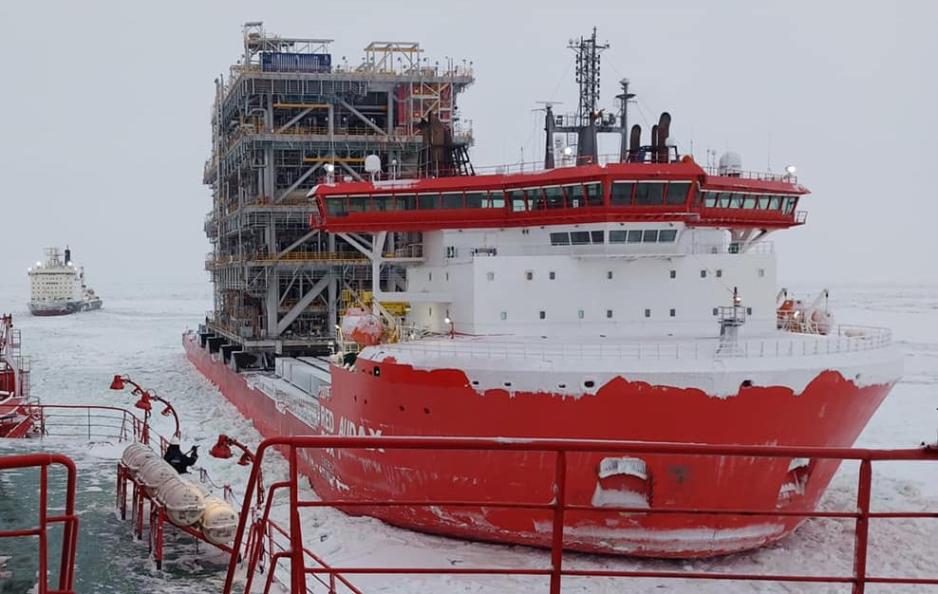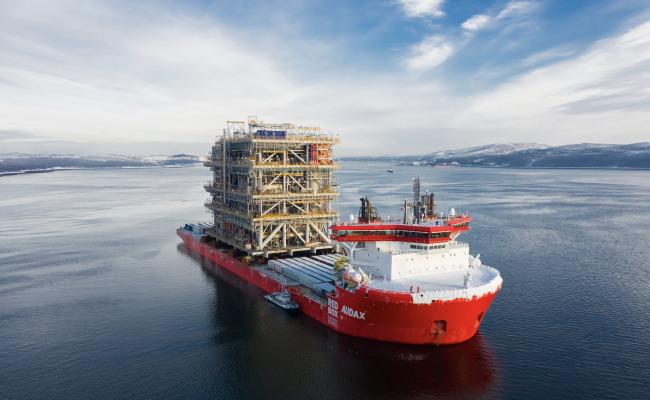New U.S. Sanctions Target Arctic LNG 2 Blocking Red Box Shipping Company

Red Box’s Audax carrying a module for Arctic LNG 2 in 2022. (Source: Novatek)
With its latest round of sanctions the U.S. goes after Singaporean shipping operator Red Box. A notorious violator of Western sanctions the company continued delivering modules for liquefied natural gas from China to Russia throughout 2023 and into 2024. The new measures also target vessels working for Rosneft’s Vostok Oil project.
The U.S. torrent of sanctions targeting Novatek’s Arctic LNG 2 project continues. Just months after blocking key Arc7 ice-class liquefied natural gas (LNG) carriers, the U.S. has taken aim at Novatek’s ability to finish the project and construct future LNG plants.
As part of expansive new measures announced by the State Department yesterday, Singapore-based shipping operator Red Box has now been sanctioned.
Red Box’s heavy lift vessels Audax and Pugnax repeatedly violated sanctions delivering prefabricated LNG modules from China to Russia. HNN documented Red Box’s activities in a number of articles over the past two years. During that time frame the company’s vessels completed five voyages carrying modules, including a two months-long journey across the frozen Northern Sea Route this winter.
"Steel structures"
At the time the company’s CEO Philip Adkins insisted rather forcefully in a phone call with HNN that Red Box was not violating sanctions as it was simply delivering “steel structures” from point A to point B without any contractual relationship with Novatek or any sanctioned entities. U.S. officials clearly disagreed and now slapped the company with secondary sanctions. A recent exposé in the Financial Times also highlighted Adkins’ questionable morals.
Red Box was sanctioned for “having materially assisted, sponsored, or provided financial, material, or technological support for, or goods or services to or in support of Arctic LNG 2” the State Department announcement reads.
Hampered the project’s ability to export energy
The U.S. has now extended sanctions targeting the project directly, its construction facility, LNG carriers built for the project, and heavy lift vessels carrying modules from China. These actions forcefully back up repeated official statements confirming the U.S.’ aim to “kill the project.”
“These designations have already hampered the project’s ability to export energy and resulted in significant increases in the project’s construction costs. Today’s actions demonstrate the United States’ continued resolve to constrain the Arctic LNG 2 project’s production and export capacity and limit third-party support to the project,” the State Department explains.
A second operator also sanctioned
With their high ice-class, Audax and Pugnax were custom-built to provide transport services for Novatek’s Yamal and Arctic LNG 2 projects. The new blocking measures will likely complicate their ability to carry future modules from China or elsewhere to complete Arctic LNG 2 or the upcoming Murmansk LNG project.
U.S. sanctions also target another heavy lift vessel operator, Hong Kong-based CFU Shipping Company, and its ships Hunter Star and Nan Feng Zhi Xing. Hunter Star delivered the final module for Arctic LNG 2’s second production train in early April allowing Novatek to attempt to complete at least two-thirds of the project. It also carried a module in May 2023.
While there are other operators of heavy lift vessels capable of carrying the modules weighing up to 14,000 tons from construction yards in China to the construction yard near Murmansk, the list of available shipping companies continues to shrink.
European operators Boskalis and GPO did not transport any modules following the full-scale invasion of Ukraine and the implementation of sanctions.
This leaves Chinese COSCO as the only remaining operator who has carried modules and has not been sanctioned. Due to its size as one of the world’s largest shipping operators it is unlikely that COSCO Shipping will face direct sanctions by the U.S.
Sanctions also target transport for Vostok Oil
The latest sanction package also targets Rosneft’s ability to complete construction of its Vostok Oil project. For the past two years dozens of vessels have carried supplies to build port facilities and related infrastructure.
A dozen cargo vessels have now been sanctioned by the U.S. To what degree the measures will affect the ships’ abilities to continue bringing construction materials to the Taymyr peninsula remains to be seen. As they operate exclusively in Russia and along the Northern Sea Route the impact of blocking measures on their operation may be limited.


